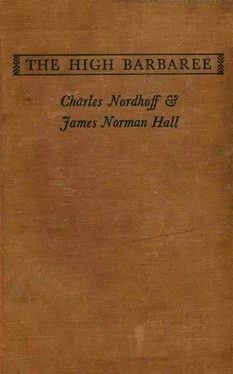The hundred and sixtieth meridian of east longitude bisects the island of Guadalcanal. The same meridian, nearly a thousand miles to the north, narrowly misses Ponapé, in the Caroline Group. Truk lies west of Ponapé, Kusaie east-southeast. Six hundred miles to the southeast and below the line is Nauru. Seven hundred miles west of Nauru, but above the Equator, is a tiny island with a formidable name: Kapingamarangi. From the point where the hundred and sixtieth meridian crosses the Line, no island closer than three hundred miles is laid down on modern charts.
The islands of this distant sea, with their wild inhabitants and outlandish names, were only less familiar than the New Bedford waterfront to the American whalers of a century ago. In the great days of sperm whaling, shortly before the Civil War, this region was a part of the Line Grounds, resorted to by schools of cachalots at certain times of the year. Here the beamy old vessels from New Bedford and Nantucket filled their barrels with oil and spermaceti, some to be carried home in their own bottoms, some to be transshipped from Russell, New Zealand. On the rich volcanic islands, where a runaway sailor stood no chance of escape and hogs, fruit, and vegetables abounded, the skippers would give their men a run ashore, and fill their ships for a week or two with Micronesian girls. The Yankees were the great explorers of these out-of-the-way corners of the Pacific; they were on the lookout for whales and bound nowhere in particular. At night they hove-to, like old East Indiamen; at daybreak they made sail once more, with men aloft, on the watch for the bushy, forward-slanting spouts of their prey.
When petroleum put an end to sperm whaling, and steam, little by little, put an end to sail, these regions, formerly frequented by whalers, were rarely visited by white men who now kept to the arbitrary sea lanes. A few vessels, most of them flying the British flag, still plied among the islands, in search of copra and indentured labor. At the close of the last war, the Marshalls and Carolines, mandated to Japan, were closed to other navigation, becoming forbidden islands to any but Japanese, where the farsighted Yamamoto was building great air and naval bases in defiance of the League of Nations.
The Japanese gave no encouragement to cartographers, nor to the British and American scientists who wished to study Micronesia; white travelers who wanted a glimpse of the mandated islands found visas impossible to obtain. At the outbreak of the present war, our charts of the Caroline and Marshall groups were old and unreliable. Save for a scattering of Germans, the whalers had been the only men of white blood to know these regions well, but they had trusted more to seamanship than to sextant and chronometer. Today, with the tide of Japanese triumph ebbing fast, Americans have again penetrated the lonely regions their forefathers sailed.
On a morning late in the year 1943, calm reigned over a wide stretch of that equatorial sea. The constellations of the tropics paled with approaching dawn and the first shafts of sunlight revealed an unbroken horizon fringed with stationary tufts of fair-weather cloud. A flock of pelagic birds of the gannet kind rose from the water and trailed off to begin their day’s fishing. The sea was empty in all directions save one. Scarcely more than a mile distant from where the birds had rested, a navy patrol bomber rode the gentle swell, a sea anchor keeping her head to a light easterly breeze.
She was a Catalina, or PBY, one of those dependable old ships of the American and British navies, built in San Diego and known and admired by airmen the world over. Catalinas had fought bitter combats with German subs in the Caribbean, marked down the mighty Bismarck for destruction, helped turn the tide of war in the Aleutians, and torpedoed Japanese men-of-war in the Battle of Midway.
The name on her hull—High Barbaree—and the squadron insignia, a spitting tomcat, were half obliterated by splinters of AA shell. Both of her engines had been wrecked beyond repair and her wing riddled by flak.
Prone on the wing, near the starboard engine nacelle, Lieutenant Alec Brooke kept watch. He was a tall spare fellow in his early twenties, with unkempt blond hair, a deeply tanned face, and blue eyes reddened by a sleepless night. He was dressed in a singlet and a pair of shorts. The sun was an hour high when his navigator, Lieutenant Eugene Mauriac, crawled through the hatch onto the wing. Mauriac was an American of French descent whose family through four generations had lived in Napa County, California. He wore a handkerchief knotted at the corners over his head. Stretching out on the wing beside the pilot, he stared at the sea with a stony, incredulous look.
“I’ve slept like a fool,” he remarked, presently. “Sorry, Alec.”
“Good thing you did. . . . We’re lucky. She’s making very little water. . . . You’ll need more than a handkerchief over your head in another hour.”
“Lucky, you say? I’m not so sure. The still’s wrecked.”
Brooke turned to glance at his companion.
“Why did it have to be that? Well, we can’t expect to have all the luck in the world. . . . How far from here to Guadal?”
“About five hours.”
“If they waited for first light they could be here by eleven.”
Mauriac nodded.
“Go down and get some sleep. My turn now. Toss out my cap, will you?”
Alone on the wing, Mauriac stretched out, his chin resting on his crossed arms. For a little while he forgot their predicament as what seemed a nightmare, in retrospect, took on the hard outlines of reality. Of the crew of the High Barbaree only he and Brooke remained.
There had been five of them, bound together by the closest of all associations. He thought of Willock, the bombardier, the crazy kid from Texas who could perform miracles with a pair of dice or a pair of 500-pound bombs. Over the interphone he had heard Willock, bleeding to death in his compartment in the nose, announce in a weak voice: “One egg left, and she’s hot!” He thought of Meyers, the tough little radioman from Brooklyn, with his cynical humor and his passion for Jap souvenirs which he expected to take home on his first leave. George Lyman, the co-pilot, had died of his wounds late in the afternoon. He and Brooke had buried the three of them during the early part of the night. Mauriac’s thoughts shied away from that memory, back to the beginning of the patrol when they had taken their final jeep ride down to the revetment area at Henderson.
The Navy had reason to suspect that an enemy convoy was setting out from Truk or Ponapé in an attempt to relieve the Gilberts; the situation at those islands was becoming desperate from the Japanese point of view. The High Barbaree had taken off before dawn, bound on a solitary long-range reconnaissance with orders to proceed 800 miles on a course of 335 degrees, and then to fly 300 miles at 112 before heading home for her base.
The big amphibian had droned hour after hour on her course, flying at 8000 feet. The sun rose in a cloudless sky, illuminating horizons such as only the airman knows. The Pacific stretched away without land in sight, a flat boundless desert of blue. As the morning advanced, heavy cloud banks appeared to the northwest; raising them on the horizon and watching their swift approach had given Mauriac his only impression of the rotundity of the earth. A little before noon he had informed Brooke that it was time to turn to starboard on their new course. They had sighted nothing so far.
It was midafternoon when they emerged from a rain squall to come suddenly upon a big enemy submarine on the surface not three miles distant. The Jap made no attempt to crash-dive, realizing, perhaps, from the sound of the engines, that he had only one plane to deal with. Nothing but a slow patrol bomber would be so far distant from any American base. The enemy had decided to shoot it out, with a fair prospect of bagging the PBY like a sitting duck. They’d come close to finishing her with their first salvos. The black bursts with momentary cores of scarlet, blossoming at short intervals, had riddled the Cat with fragments of hot metal. Brooke had made two runs on the sub, straddling it with a pair of 500-pounders and scoring a near miss astern. Then, with one engine dead, he swept down through a storm of flak to 500 feet. As the pilot banked to turn into his final run, Mauriac caught himself yelling while his fifty-caliber Browning in the port blister stitched a seam fore and aft on the pigboat. Next moment the last of Willock’s bombs exploded in a beautiful direct hit, amidships. The plane lurched, staggered, and leveled off. Score for the High Barbaree even if they couldn’t fetch the captain’s pants back to Henderson.
Читать дальше












